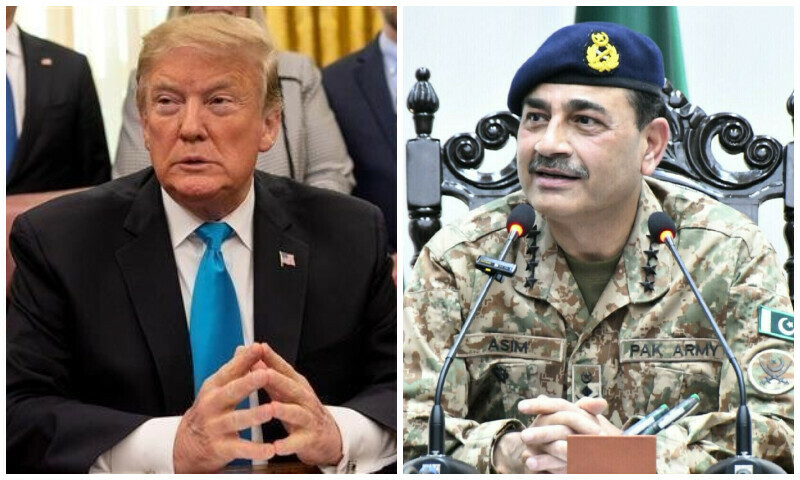By Staff Reporter
ISLAMABAD: President Donald Trump will host Pakistan’s top military official, Field Marshal Syed Asim Munir, for lunch at the White House on Wednesday, a meeting that underscores US engagement with a key ally amid rising tensions in South Asia.
The closed-door gathering in the Cabinet Room, reported by Pakistan’s Dawn newspaper, is being celebrated in Islamabad as a diplomatic coup.
The invitation follows a month of intense diplomatic maneuvering in South Asia, underscored by an Indian delegation’s meeting with US Vice President JD Vance earlier this month, an encounter Indian media touted as a success, while pointing to Pakistan’s apparent struggles to secure similar high-level engagements.
Pakistani officials view Munir’s White House visit as a counterpoint, signaling Washington’s continued interest in balancing ties with both South Asian powers.
Tensions between India and Pakistan flared last month after a rare air combat clash, triggered by India’s claim that a terrorist attack in Pahalgam, occupied Kashmir, was linked to Pakistan-based militants, a charge Pakistan rejects. The incident escalated into a dogfight between the nuclear-armed neighbors’ air forces, revived fears of escalation not seen since the 1999 Kargil war. President Trump broke a ceasefire on May 10.
Field Marshal Munir, recently elevated to Pakistan’s rare five-star rank—the first since Ayub Khan in 1959—is in the United States on a five-day official visit. His trip has already stirred attention, particularly for his sharp worded statement aimed at India.
Speaking to a packed crowd of Pakistani Americans at the Four Seasons Hotel in Washington’s Georgetown neighborhood on Monday, Munir urged India to engage with Pakistan “as a civilized nation” rather than pursuing regional dominance.
He dismissed India’s accusations over the Pahalgam attack as a pretext for aggression, accusing New Delhi of trying to establish a “new normal” of breaching international borders—a move Pakistan, he said, had decisively countered. “We would rather embrace martyrdom than accept this dishonor,” he told the audience, sparking cheers and chants of support.
The event saw supporters shower Munir with rose petals, though outside, protesters from the opposition Pakistan Tehreek-e-Insaf (PTI) party rallied for the release of jailed former prime minister Imran Khan barely pierced the fervour inside the venue.
Munir also weighed in on broader regional dynamics, affirming Pakistan’s “clear and strong” backing of Iran in its ongoing conflict with Israel, while simultaneously supporting U.S. efforts to de-escalate the war. “We want this war to end immediately,” he said, signaling Pakistan’s hope for Middle East stability.
Perhaps the most tangible outcome of Munir’s visit is the deepening of Pakistan’s counterterrorism alliance with the United States, particularly in combating the Islamic State Khorasan (IS-K) group. On Tuesday, Gen. Michael Kurilla, head of U.S. Central Command, hailed Pakistan as a “phenomenal partner” in this fight, spotlighting its operations along the volatile Pakistan-Afghanistan border.
Testifying before the House Armed Services Committee, Kurilla detailed how Pakistani forces, bolstered by U.S. intelligence, have killed dozens of IS-K militants and captured key figures—including Mohammad Sharifullah, a mastermind of the 2021 Abbey Gate bombing in Kabul that claimed 13 American lives. “The first person Munir called was me,” Kurilla recalled. “He said, ‘I’ve caught him—ready to extradite him back to the U.S. Please tell the Secretary of Defense and the President.’” Sharifullah was swiftly handed over to U.S. custody.
In remarks to the Senate Armed Services Committee, Kurilla noted Pakistan’s “dozens of operations” targeting IS-K sanctuaries in the border regions, underscoring Islamabad’s critical role in thwarting terrorism across Central and South Asia. Despite enduring over 1,000 terrorist attacks last year—leaving approximately 700 security personnel and 2,500 civilians dead—Pakistan “has been a phenomenal partner in the counterterrorism world,” Kurilla said. He warned that while the Taliban have driven IS-K into tribal areas, these pockets still enable the group to plot attacks against regional allies and the U.S. homeland.
Speaking to Pakistani Americans, Munir praised their economic contributions and dismissed concerns about a brain drain, reframing it as a “brain gain.”
He sidestepped domestic political controversies, gently rebuffing a guest’s criticism of former Prime Minister Imran Khan and responding to a quip about opponents needing their “software fixed” by defending the right to dissent in democratic societies. The evening ended with mutual pledges to strengthen Pakistan’s resilience.
Separately, the US State Department on Tuesday addressed President Trump’s repeated offer to mediate between India and Pakistan over the Kashmir dispute, a decades-long flashpoint that flared anew with last month’s air combat.
Spokesperson Tammy Bruce clarified that while Trump is willing to facilitate talks, he cannot compel either nation to participate. “As President Trump has stated, [everyone] has the right to define its own future. He offers his help, and it’s up to whoever he is offering it to, to whether or not they’ll accept it,” she said, acknowledging India’s firm stance against third-party involvement.
Trump has described Kashmir as a “thousand-year-old” conflict and has publicly volunteered to intervene several times in recent weeks, especially as tensions spiked.
Bruce emphasized a hands-off stance on India’s decision-making. “I wouldn’t speak to the nature of another country’s decision-making. That’s up to them.”
Yet she praised Trump’s willingness to engage. “We live in a fascinating, exciting time where we got a man who can make the difference and he’s generous about making that difference. He could have chosen to have his term be about anything other than peace and making America great again, but he is stuck with that.”
Bruce’s remarks suggest the White House remains keen to play a role in easing South Asian tensions, though without pressing either side. “So, I wouldn’t speak to the nature of another country’s decision-making. That’s up to them, but, I think, all of us are grateful that we have a president who is willing to help, and wants to help,” she added.
Copyright © 2021 Independent Pakistan | All rights reserved




